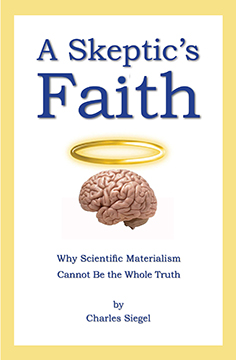
A Skeptic's FaithWhy Scientific Materialism
Cannot Be the Whole Truthby Charles Siegel
copyright © 2023 by Charles Siegel
Buy or preview
the book
|
Warning:
This Book May Change Your WorldviewWhether you are a materialist or follow a conventional religion, this book will make you think hard about your beliefs. Or if you are uncertain, this book will help you think clearly about science and religion.
This book thinks critically about materialism, the theory that only matter exists and mind or spirit is a byproduct of matter. It shows that what philosophers call "dualism," the idea that matter and spirit exist independently, is more plausible than materialism.
It begins by reviewing the arguments that philosophers have used to show that computers cannot have consciousness.
Then it shows that materialism cannot provide a basis for scientific knowledge or morality-and shows that it is self-contradictory to claim that science has proven that only matter exists.
It looks critically at the evidence from near-death experiences and at the attempts to explain away these experiences.
It concludes by asking how we can reconcile religion with science, looking at a wide range of religions.
From the beginning, the book takes a skeptical, critical approach to both materialism and religious faith:
"As a congenital skeptic, I cannot believe something unless I have some reason to think that it is true. Yet I find that preachers of materialism can be just as dogmatic as preachers of religion.
"For example, Steven Pinker claims that a computer that modeled the human brain would have consciousness like ours because the idea that computers can have minds is 'as fundamental to cognitive science as the cell doctrine is to biology and plate tectonics is to geology'-which is like saying you believe God created the universe because it is a fundamental doctrine of your religion.
"Pinker thinks he is being scientific, but science is based on evidence. There is plenty of evidence for cell doctrine and plate tectonics, but no evidence at all that computers can have consciousness."
This book rejects both materialist dogmas and religious dogmas. Instead, it follows the evidence and sees how far it can lead us.


